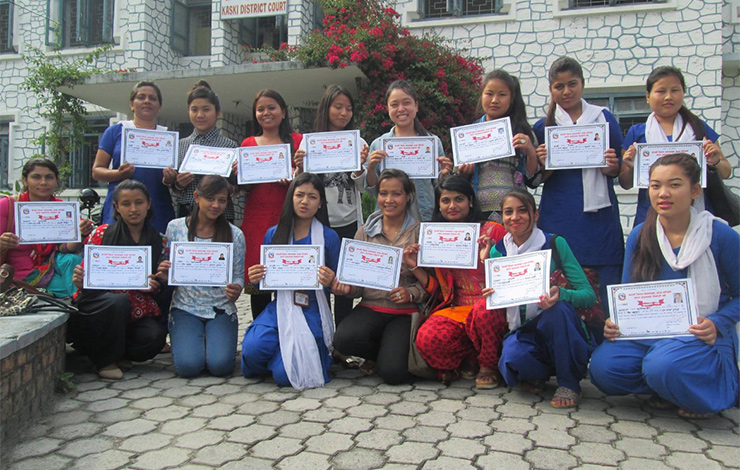In Nepal, trafficking and sex worker abuse often go unreported, as many victims lack knowledge of how to take legal action against perpetrators and fear stigmatization by their families and communities as well as mistreatment by corrupt police. This program—led by trafficking survivors—provided paralegal training, certification, and practicum experience to trafficking survivors in order to help them achieve financial independence and serve as a resource for other survivors.
Challenge

The inequality of women and girls is reflected particularly in the high rate of human trafficking, a large percentage of which is sex trafficking. Many Nepalese women are vulnerable to trafficking domestically and cross-border to India. The 2011 census indicated that women make up more than half (51.5%) of the Nepali population, yet they suffer from unequal treatment from patriarchal and discriminatory attitudes. This includes practices in all contexts: domestic, employment, education, and public participation. Patriarchal and discriminatory social-cultural norms, poverty, and lack of economic opportunity are central factors giving rise to trafficking and gender violence. In Nepal, traffickers often target girls and/or their families in rural communities who are impoverished, uneducated and lack opportunities.
Many women who are trafficked have difficulty with subsequent rehabilitation and reintegration because they are blamed and ostracized by their families and communities, and are without capacity for financial independence, which makes them susceptible to being re-trafficked. Gender-violence is often not reported or pursued within the criminal justice system. Victims (or their families) fear stigmatization by their communities or abuse from police, and they lack the knowledge and financial resources to take legal action. In addition, ignorance and discriminatory attitudes among police interfere with the investigation of complaints, enforcement of laws, and protection of rights.
Program Summary
SASANE offers a Paralegal Training Program to female trafficking survivors. It delivers the training to 30 survivors in Kathmandu each year. The program provides in-depth paralegal skills training with the goal of paralegal certification. With this, the women are empowered to achieve financial independence to protect themselves, and to act as leaders and legal resources for their communities and other victims.
In addition to assisting individual survivors, the project promotes systemic change by raising awareness of the law and women’s rights, and by encouraging the reporting and investigation of gender-violence within the justice system.
The program consists of three stages:
- One month of in-class theoretical training delivered by a lawyer and experienced SASANE paralegals. It provides an overview of the Nepali legal system and teaches about human rights and other laws related to gender-based violence, police procedure, court procedure, trafficking practices, and psycho-social counselling to assist survivors
- 6-month practical placement at a local police station at one of several local police stations. This placement allows the women to apply and develop their legal knowledge and skills, and the trainees receive a monthly stipend intended to cover their monthly expenses and to build their capacity for financial independence.
- Completion of the Paralegal Certification Examination through the District Court. If successful, they receive a Paralegal Professional Certificate.
Impact
The beneficiaries of this project are three-fold:
- Paralegal trainees: About 42 percent of the certified paralegals return to the police stations where they perform a combination of unpaid and paid work. They generally provide pro bono assistance to other gender-violence victims and provide other legal assistance for a modest fee to parties who can afford it. About 25 percent become employed with SASANE on a fulltime or part time basis, assisting with the paralegal program or delivering awareness training in rural communities.
- Other victims of gender-based violence: SASANE paralegals have assisted in filing 3,085 First Information Reports and complaints with police regarding women, and 1,085 regarding children. SASANE has observed a substantial increase in clients and reporting since the program began, as SASANE has developed a reputation with clientele and the community. Likewise, police are more inclined to refer clients and work cooperatively with the paralegals.
- Nepali women and society generally: By educating communities about laws and fundamental rights, and by providing empathetic, pro bono legal assistance to victims, SASANE paralegals will encourage reporting of gender violence and will increase the likelihood that laws will be enforced, rights realized, and justice attained.
These benefits impact Factor 2 (Corruption), Factor 3 (Order and Security), Factor 4 (Fundamental Rights), and Factor 8 (Criminal Justice) of the WJP Rule of Law Index, notably: Subfactor 2.3: Police do not use public office for private gain; Subfactor 3.1: Crime is effectively controlled; Subfactor 4.1: Equal treatment and absence of discrimination; Subfactor 4.2: Right to life and security of person guaranteed; 8.1: Criminal investigation system is effective; and Subfactor 8.5: Criminal system is free of corruption
Partners
SASANE does not work with any formal partners in delivering the Paralegal Training Project. SASANE works informally with other NGOs and police. Police allow SASANE paralegal trainees to complete their placements on police station premises, and refer gender-violence complainants to them for legal and other assistance. Other NGOs who encounter or rescue gender-violence victims often refer them to SASANE for assistance, including for potential participation in the Paralegal Training Program. Likewise, SASANE trainees and paralegals often connect complainants to other organizations and services who might be appropriate to assist with their circumstances, e.g. shelters.


